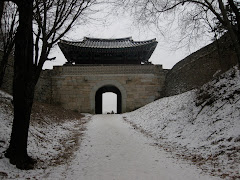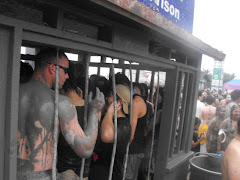A letter to a new teacher preparing for Korea.
I once heard the breakdown of a typical first year in Korea like this:
1-3 months: Fascination with everything new. This is when you make many new friends and become adjusted with your new life.
4-6 months: Acceptance of the new culture and many new experiences. This is the make or break point; you either love it or hate it.
7-9 months: Fascination wears off. Frustration becomes common at times. Countdown to the contract termination date begins.
10-12 months: Countdown to departure continues. Good or bad, you know if you want to return for a second year or do something different. You begin to think about what is next and what you want to experience in Korea before you leave.
It's probably a fair assessment of ESL life in any country. I am fortunate and have made many good friends in Korea. Some are students who have become friends and others are foreign teachers just like me. One of my best friends was my first student, a 52 year old businessman and father of two. He remains a good friend and my "Hyung-nim" (honorific title for older brother). Another good friend became my girlfriend after six months. She and I first met at the local library.
There is always a consortium of foreigners to be found in any city, or through social networking sites. It can be a great way to meet people. Most foreigners are friendly, willing to share advice, and eager to meet on weekends and socialize. English speaking travel groups are another opportunity to get connected. I often suggest this to my students who wish to make friends with foreigners and practice their English. Plus, you get to see the countryside, usually, at a group or discount rate.
A note of caution about your foreign teacher friends. Almost all are here on a one year teaching visa, like you and I, so each have a different start and end date. With this in mind, it can be disheartening at times when the good friends you make leave the country at the end of their teaching contract. This happens numerous times throughout a year in Korea, so get used to making friends and losing friends. It can, and does, suck at times.
Frequent Skype with family and friends back home is an important way to maintain your composure. It does get lonely at times, and this helps ease the pain. The time difference is currently 14 hours ahead of Eastern Standard, though it changes to 13 hours in the summer months because Korea does not observe Daylight Savings. Regular exercise is another helpful practice; something to take your mind off the obvious fact that you are 7,000 miles from home in a strange land, surrounded by strange people. It's especially helpful if you partake in the frequent weekend drinking activities with other foreigners.
You should be prepared to get sick sometime during your first few months in Korea. It happened to me and many foreigners I know. A medical student turned ESL teacher told me our bodies are not accustomed to the many different strands of bacteria and viruses, and hence, we are more susceptible to new disease. Also, our bodies are adjusting to the new dietary habits so certain nourishment may be absent. I'm no doctor, but it sounds reasonable. So, I'd suggest a good supply of vitamins for your first few months, and despite this, be prepared to get sick at some point. My experience was a one week battle with tonsillitis during my second month in Korea. The good news; doctor visits and pharmaceuticals are cheap when covered by the Korean National Health Insurance, so make certain you have this. Unfortunately, the Korean drugs do not seem to have the same amount of 'lift' as back in the states, and for one reason or another, most illnesses seem to take twice as long to recover from. Really, it sucks being sick here.
The E-2 visa process is pretty painless, once you complete the necessary paperwork and send in to your employer. I had to visit the Korean Consulate in Chicago for a face to face interview and to physically receive the visa. I think I had actually to give them my passport and return 2-3 days later to pick it up, or they can mail it to you. The biggest pain in the ass was assembling all the necessary documentation; transcripts from my university, an original copy of my diploma, a criminal background check, passport photos, and a day trip to Cleveland.
Anyone teaching English in Korea should consider packing, or having sent to you, Mad Libs (remember those?), the board game Scrabble, and a Junior level Trivial Pursuit game or cards. These are all good games for almost any age group, including the adults I teach. A deck of cards is another good idea. Scrabble is a popular Korean game, but it's very expensive here, sometimes 50,000 Won in a bookstore. Most of the larger bookstores offer an English section, though the books are usually expensive, and obviously, selection is limited. The library, as always, is a great resource. It's free and most library systems are steadily increasing their English selections.
Because I teach adults at a private hagwon, I do not have many of the headaches other foreign teachers in Korea experience, usually with children. That said, I have experienced some difficulty with my hagwon, though I understand this to be common with nearly every teacher, especially at hagwons. Someone once referred to hagwons as "crapwons" because management will always attempt to screw their teaching staff in some form or another. While this may seem extreme, I have heard some horror stories. Thankfully, my experiences were not as dramatic, though you should be extra careful when dealing with a hagwon. Public schools, I understand, are a different story. There is less potential for dispute because it's a public institution and not private, so they are not trying to save money at every opportunity. Public schools also offer a generous vacation schedule.
Teaching adults, I am actually one of the few, perhaps 10% of all foreign teachers, who are not involved with children on a daily basis. I teach primarily Business English and I truly enjoy the discussions I have with my students. For me, I treat most classes as casual conversation, and less the rigid class structure that is typical of most Korean teachers. I will talk about this more in detail. The traditional Korean education system, K-12 and even some college, does not encourage students to think for themselves. Instead, students attend long lectures, memorize loads of information, and are sometimes incapable of answering simple questions like, "what do you think about this or that?" It's one of the many puzzling aspects of Korean culture. This and the time schedule most Korean students keep, usually 8am to midnight, Monday thru Friday. It's also common for middle school and high school students to attend 2-3 private academies or tutors after school, often into the early morning hours. Crazy, I know, but it's all part of the 'English Fever', a controversial system that fuels the private education industry and provides employment opportunities for people like me.
Formal lessons in the Korean language are not cheap, so I envy anyone who pursues this. Obviously, the biggest help to any language is emerging yourself in the country and practicing every day with the locals. Strangely, in Korea there is a substantial difference in dialect between Seoul and Busan, probably comparable to New York and Texas. Thus, it can be difficult to understand the different pronunciations. If you can read Hangul (Korean alphabet) prior to arriving in the country, you are two steps ahead. Local vocabulary, proper pronunciation, and slang will all develop in time. If you show a sincere willingness to learn the language or practice in public, that should benefit you immensely.
Same is true with Korean culture and etiquette. You should be polite, demonstrate courteous behavior, and respect the elders as much as possible. Remember, it's an honorific society, so this behavior is displayed everywhere, including the language. My biggest frustration with Korean way of life is the pushing and shoving that is commonplace on the subways and when entering/exiting elevators. To most Westerners, it's considered rude and an invasion of our 'personal zone', but to most Asians, it's fair game. It also doesn't make much sense to push your way into a crowded space when most people would stand aside to allow the space to clear out first and then enter. Instead, little old ladies (Korean ajjuma) push past you with strong force before you even have an opportunity to exit the elevator or crowded subway. It does grow old, quick, and sometimes a subtle, yet strong shoulder or elbow cannot be avoided... though I do not condone this type of activity.
My other suggestion is to experience Korean foods as much as possible, refer to dishes by name, and don't be afraid to try new things. I love the food here; it's spicy, nutritious, and cheap. Many people, including myself, lose weight their first few months. But, you will develop a longing for Western foods after the love affair wears off. Ask your family to mail you Mac & Cheese and other transportable foods you may miss from home. Most other foods can be acquired at E-Mart (similar to a Korean Wal-Mart), Lotte Mart, Home Plus, etc. I would also recommend a Costco membership for 30,000 Won. There are multiple stores in Seoul and Busan. There you can find blocks of cheddar cheese, apple pie, and many other Western food items that remind you of home. Splitting bulk purchases with co-workers or friends is an inexpensive and practical way to enjoy this.
Coffee shops have exploded in the past five years, and in November, E-Mart reported they sold more instant coffee than rice for the first time. It's a good example of the change that continues to sweep this country. Bakery chains are also a common sight and are filled with many exotic, though sometimes weird baked goods. Many Western food chains exist here, usually in metropolitan areas; McDonald's, Burger King, Quiznos, Subway, Outback Steakhouse, Baskin Robbins, Dunkin Doughnuts, Starbucks, etc. Good luck finding Western foods in a rural area or small town.
I would suggest contacting the Seoul Global Center to serve as a reference guide, prior to departure. The service in Seoul helped me immensely at times, and they sent me a comprehensive resource book free of charge.
The Korea Tourism Organization is another great resource for living and traveling here.
I also read many books prior to leaving the U.S.
Living In South Korea by Rob Whyte & Kyoung-mi Kim
Korea Calling by Allegra Sprecht & Jay Freeborne
Ugly Koreans, Ugly Americans by Min Byoung-chul, Ed.D.
Lonely Planet Travel Guide: Korea
Culture Smart Series: Korea
Other useful information:
In case of conflict with your employer or clarification regarding your employment rights, The Korean Ministry of Labor serves as an aide to foreign workers and is a great resource.
Korea.net: the Official website of the Republic of Korea.
I read the Korean newspapers almost daily. Both The Korea Herald and The Korea Times give good information and help to keep up with local news.
And finally, in case of Emergency, or if you wish to register as an American living/working in South Korea, the U.S. Embassy in Seoul.
This truly has been a great opportunity and I'd recommend it to any adventurous, open-minded individual. Most teachers I know have a great time in Korea and manage to save around $6,000-10,000 depending on their diligence.
Good luck!

























































































































































No comments:
Post a Comment